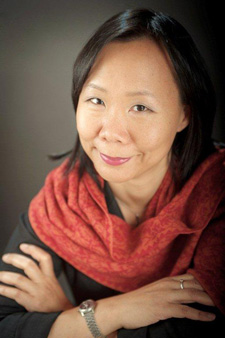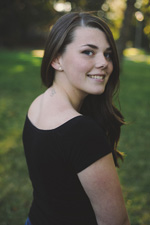Truthiness in Creative Nonfiction:
Katie Weaver in Conversation
with Fiona Tinwei Lam

Malahat volunteer Katie Weaver talks with Fiona Tinwei Lam about judging creative nonfiction for the Open Season Awards. What is the fine line between truth and falsehood? Can we trust our memories when writing memoir?
Fiona Tinwei Lam has authored two poetry books, Intimate Distances and Enter the Chrysanthemum and the children’s book, The Rainbow Rocket. Her poetry and prose appear in over 24 anthologies, including The Best Canadian Poetry in English 2010 and Slice Me Some Truth: An Anthology of Canadian Non-Fiction.
Click here for details on sending in a contest submission (deadline November 1).
You must be excited to be judging CNF, but it sounds like a big job. What do you value most in this genre? What is the one aspect of a CNF piece that you believe to be pivotal, for you, between a successful or less successful piece?
I love the incredible variety in CNF—memoir, travel or historical writing, lyric or personal essays exploring a particular concept. The strongest nonfiction makes me come away with the sense that I have gained some new or deeper insight, whether or not I'm familiar with the subject matter. The work will allow me to enter another world, time, place, or mind, and go on an experiential and/or intellectual journey with the writer.
Many writers draw the line in CNF in many different places when it comes to re-imagining, blending or colouring the truth. How much do you believe writers can or should get away with in the genre before there are passages that are 'fiction'? Is there any tell-tale sign that should warn a writer when maybe they've morphed the truth a little too much?
There can definitely be a fine line between truth and fiction. Greg Mortenson (Three Cups of Tea) and James Frey (A Million Little Pieces) are popular examples of bestselling memoirs that were riddled with exaggerations and fabrications. For those few years when I was a lawyer, I worked on legal submissions that carefully selected those facts that would build a persuasive case. In a legal dispute, there are often competing, sometimes very different narratives, each based on apparent facts which—through cross-examination or the presentation of contradictory facts—might be revealed to be true, false, or somewhere in between.
That line between truth and falsehood is clearer in journalism, as in the notorious case of reporter Jayson Blair, who during his five years at the New York Times fabricated quotations from sources, wrote about events that never occurred, and plagiarized from other news outlets. Memoir can be a bit more problematic. It incorporates many of the techniques of fiction in terms of developing characters, conflict, narrative arc, and dramatic tension. There will always be many different points of view and interpretations of any one event. Memory can be faulty. As author and instructor Madeleine Blais has put it, "truthiness" seems to be the aim with many memoir writers who are aiming for the emotional truth.
As for tell-tale signs about what makes a work of nonfiction not ring true, there are too many to mention, some blatant and some subtle. Often a judge's gut instinct will tell her/him that someone has submitted a piece of fiction to a nonfiction contest. CNF may use elements of fiction, but it is not fiction. My view is that nonfiction writers should be truthful, not just "truthy" or "truthlike," allowing of course for the existence of many different and even conflicting truths. It's in trying to tell the truth, struggling to navigate those conflicting truths, that a more complex, nuanced, profound understanding of an issue can arise.
The Malahat Review has increased the prize money by $500 per genre for the winners of the Open Season contest. What do you think about that? Do you think the money is what draws in submissions, or are there different reasons a writer might submit?
Writers are experiencing significant financial hardship these days, as a recent Writers' Union of Canada survey has showed. Writers might spend months or years on any particular piece. They definitely deserve appropriate remuneration. A writer can certainly celebrate much more with $500—and still put a portion of it toward living expenses! Money is only part of what draws in submissions of course—prizes (even just being shortlisted for a prize) can attract attention to one's work and provide some validation not only from readers but also from agents and publishers.
You recently judged the Bronwen Wallace Award. Do you think you'll be applying any new skills from that experience to the Open Season contest? And, on a different note, has judging contests changed the way you write?
Yes, I was one of three poetry judges for this year's Bronwen Wallace Award. I've been on juries in the past for Canada Council, for The Vancouver International Writers' Festival, and for other contests in the past. Many other judges have said this before, but when there are a lot of submissions to leaf through, that opening poem or page must make a clear impression. Judges quickly get a sense of whether a piece has been written and revised with care and thought. Judging contests hasn't changed the way I write, but it has influenced how I might revise. More importantly, I emphasize when I teach that students ought to pay attention to effective openings. Of course, the writer still must follow through right to the conclusion—but first the writer has to ensure the reader will actually want to read to the end.
On top of your CNF, you are well-known for your poetry, your fiction and even your children's book. The way you write your poetry attracts me, as a nonfiction writer, in the way it breaks down your real-life experiences one-by-one and distills each image, thought and moment. My impressions aside, how does your knowledge of writing in one genre play off the other? What's that dynamic like in the writing process?
Poets often try to hone in to find the essence of key experiences. The concision, precision, exactitude and rigor of poetry, where every word and pause counts, provide excellent background and training for writing prose. Word play, strong imagery that appeals to the senses, attention to symbols or the symbolic, a sense of rhythm—these all add so much to any piece of writing, whether poetry or prose. A few people might conflate flowery writing with poetic or lyrical writing—but plenty of fabulous poetic writing is taut, succinct, visceral, hard-edged. Some well-known nonfiction (and fiction) writers would make fabulous poets—perhaps they secretly are!
It's actually fascinating to try to write about a particular experience in a few different genres to see what works best. Each genre will end up shaping the material in a different way, adding other layers. Sometimes the material itself will reveal which genre will work best. For example, if I'm doing free-writing, I might not start with any particular genre in mind. It's when I look back at the material later that I might see potential for a poem, a story, a short work of commentary, or piece of creative nonfiction—or some combination thereof. I'll look to see if what I've written is more narrative or descriptive, if there characters, try to identify the voice and tone, look for nuggets of very distilled imagery that can stand on their own, etc.
Can you tell me a little bit about what you're working on right now? And, after all of this judging, do you plan to enter in a contest any time soon?
I am hoping to gather my creative nonfiction pieces that have been published in various anthologies and in The Tyee online news magazine over the years into a collection, augmented by some new work. I am also continuing to work on poems and more poetry videos. My most recent one was screened last year at last year's Zebra poetry film festival in Berlin, and this year I'm hoping to produce and co-direct a new one employing rotoscopic animation that will be based on a poem by one of my former mentees, Downtown Eastside poet Henry Doyle. I'm also working with a friend on a fun poem of my own using stop action animation. As for submitting to contests, there's nothing like a deadline! My writing time has tended to be taken up with work tailored to a particular purpose or publication, but if I have something worthy that is ready at the right time, why not?

Katie Weaver
* * * * * * * *









